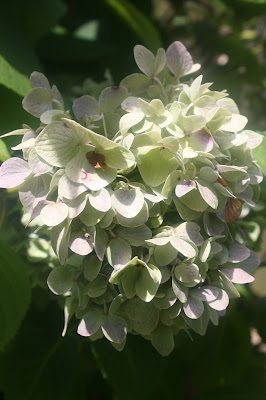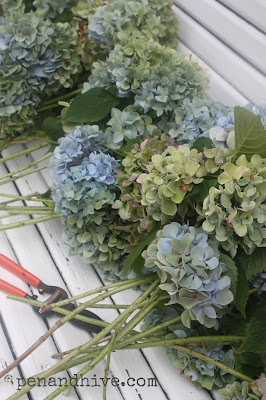This spring I was visiting a friend and she wanted me to look at her hydrangeas to see why they hadn't bloom the year before and to see if I thought they would bloom this year. She took me to where I expected to see a hydrangea bush and I said "Where is it?"
"There." She said pointing to the ground.
I looked down to see a mound of new growth a few inches high with six or seven dead sticks sticking up. I told her that I hated to tell her but it probably wouldn't bloom this summer either. I can't tell you how many times I hear this story about hydrangeas and crepe myrtles! Especially when husbands are in fall clean up mode.
Garden clean up does not mean hacking everything down. It means doing what the plant needs to perform its best the following year.
Here is how to prune hydrangeas.
First, you want to know if your hydrangea blooms on old growth or new growth. Ninety percent of home owners have the old fashioned kind that bloom on old growth. You can tell by following a blossom down and checking to see if the stem becomes dark and woody (old growth) or if it is green all the way down (new growth). If you have the new growth variety you can prune any time
It's important to remember that hydrangeas don't need pruning. But because of their size at maturity, unless you have a large naturalized woodland garden, you are going to want to prune to keep them from overtaking your house. If you don't have much room there are smaller varieties available. When making a plant purchase be sure to see what the size will be at maturity.
Prune when the majority of blossoms fade. When I pruned mine a couple of weeks ago I noticed that in the mid south it seems to coincide with the crepe myrtles starting to blossom.
Prune after after a soaking rain if you can. I lucked out this year and we just happened to have a day of rain the day before I cut mine back. This is going to help the plant rejuvenate and recover before fall. In the south this can be wishful thinking in summer but its optimal. You can always water, of course.
Prune about 1/3 back. This is a handy guide but if you need to do a bit more to get it under control it's not a problem.
Make cuts just above opposite pairs of leaves.
Collect your pruned blossoms to dry if you want. This is also an excellent opportunity to try propagating more plants. I'll cover this in detail at a later date but with something like a hydrangea take several cuttings, stick them in the ground in a shady spot, make sure they get watered during the heat of summer and then forget about them until spring.









No comments:
Post a Comment
Let's put the social back in social media and continue the conversation on Facebook! Check out the Pen and Hive Page.